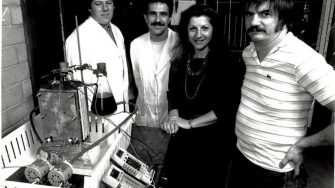Storage solutions for a sustainable future
The vanadium battery breakthrough revolutionising renewable energy technology
The vanadium battery breakthrough revolutionising renewable energy technology

After 40 years of research, vanadium battery technology developed at UNSW is being used to ensure better resilience and reliability of renewable energy sources.
While wind and solar generate affordable electricity, these energy sources are intermittent and rely on large-scale storage to avoid outages. As the demand for renewable energy continues to rise, so too does the need for more efficient and sustainable energy storage.
Since the invention of the very first all-vanadium redox flow cell by UNSW Professor Maria Skyllas-Kazacos and her team in 1984, the university has been at the forefront of Vanadium Redox Flow Battery (VRFB) technology. This work has been especially significant in the context of renewable energy and Australia’s uptake of net-zero policies.
Prof. Skyllas-Kazacos explains the simple challenges presented by wind and solar: “The sun doesn’t shine at night and the wind doesn’t always blow.”
Energy storage, however, allows users to still enjoy their renewable power systems as needed by ensuring battery systems remain charged even without sunlight or wind.
“With coal fire or gas generators, you can control how much energy you produce, so if that demand goes up you can produce more, but we can’t do that with renewable energy,” says team member Professor Jie Bao. “The key technology that’s required here is energy storage,” he adds. “Vanadium flow batteries are ideal for renewable energy storage since their cost per kWh decreases with increasing storage capacity, making them the cheapest form of energy storage for long duration applications.”
Another of the many advantages of the vanadium battery is that it can be used to help remote off-grid communities store more energy. What’s more, if the grid fails power can be taken from the VRFB and placed back into the grid to ensure less disruption and negative impact. “If the electricity transmission system went down, batteries would help keep that essential infrastructure running,” he adds.
As Australia’s best engineering faculty turns 75, there are just as many reasons why we’ve earned that title. Discover new stories weekly, celebrating the successes that have enabled progress for all.